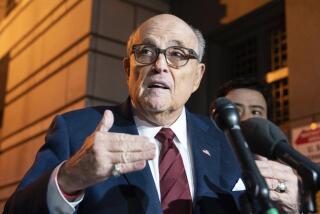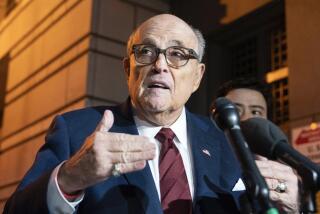Hillary Clinton Needs to Be a Woman of Substance in a Race Big on Style
NEW YORK — When Rudolph W. Giuliani met the press one morning last week to discuss the latest police shooting of an unarmed black man here, the mayor sprayed the room with invective as if he were some sort of automatic weapon himself.
In a mere half hour, Giuliani attacked the press (“Your capacity for creating a false picture is pretty impressive, and . . . you resent the fact that I try to give balance to that.”); the dead man, Patrick Dorismond (He “spent a good deal of his adult life punching people.”); Hillary Rodham Clinton, his opponent in the New York Senate race, who had accused him of dividing the city (“There’s a process called projection in psychology: It means accusing someone of what you are doing. That is precisely what Mrs. Clinton is doing.”); Al Sharpton; and the press again. Not since Don Rickles prowled the Catskills had so many New Yorkers been insulted so quickly.
It’s combustive moments like those that have Democrats dreaming Giuliani will simply beat himself in his high-profile Senate race against the first lady. But that’s almost certainly a false hope. Though she’s been on her best behavior as a candidate, Clinton is such an inherently polarizing cultural and political figure that she’s unlikely to win a personality contest even against the prickly Giuliani. If Clinton has a chance, most local analysts agree, it’s by creating an issue debate that makes the race a referendum on what each of them might do in the Senate. And that won’t be easy in a contest whose sheer spectacle and entertainment value reduce issues to a sideshow.
Both camps are treating this race as a war. (Fearful of disruptions, the two candidates guard their public schedules as if they were state secrets, announcing major events sometimes only hours in advance.) Yet, for all the intensity, the contest has been strangely static, more trench warfare than blitzkrieg. Though a New York Post survey released Sunday gave Clinton a narrow lead within the margin of error, virtually every other poll this year has put Giuliani ahead, with very few undecided.
Consistently, and ominously, Clinton isn’t drawing nearly as much support as she needs from two critical elements of the Democratic base here: Jews and white women, who like the job Giuliani has done as mayor and are unsure about her. And though the race is already drawing saturation coverage, the two already seem to be trading votes only at the margin; even in the Post poll that showed her ahead, Clinton only drew 45%. “I sometimes feel I could wake up in seven months and we could just start then,” acknowledges one senior Clinton advisor.
The ground isn’t entirely frozen. As the Post poll found, Giuliani’s never-give-an-inch response to the Dorismond shooting has helped Clinton win back some New York City Democrats who like what the mayor’s done for the city but are uneasy with his belligerent (and sometimes racially polarizing) style. The first lady has tried to stoke those anxieties by relentlessly portraying Giuliani as a divider and herself as someone who can bring the city and state together: “I want to be known by who I lift up, not who I put down,” she told a swaying crowd in a Harlem church last week.
But with Clinton also evoking such strong emotions, it’s hard to see her attracting a majority around the idea that she can be a rallying point for all New Yorkers--especially because she’s such a newly minted New Yorker. And while Giuliani regularly crosses the line from straight talk to truculence, he also has a from-the-hip authenticity that, as John McCain demonstrated, many voters find attractive. Probably no shortage of New Yorkers like the idea of Giuliani’s getting in Washington’s face the way he has New York’s.
Which is why both independent observers and Clinton’s own advisors believe her best chance is to sharpen the issue debate with the mayor. That’s the one terrain where Clinton may have an advantage. “It’s a very good environment for her in that way,” says Lee Miringoff, who directs the nonpartisan Marist College Poll.
In a CBS/New York Times poll last month, New Yorkers ranked health care and education as their top two concerns; they preferred Clinton over Giuliani on the former by almost 3 to 1 and by almost 2 to 1 on the latter. (Giuliani held an even greater advantage on crime, but only two New Yorkers in 100 tapped that as their top concern.) More than two-thirds of those polled said they preferred to use the federal surplus to pay down the national debt and stabilize Social Security and Medicare (as Clinton, like most Democrats, is urging), while only 1 in 6 wanted a large tax cut, as most Republicans are pushing.
Clinton’s problem is that Giuliani isn’t one of those Republicans; though he reluctantly endorsed last summer’s congressional Republican tax cut, he’s studiously avoided a position on George W. Bush’s proposal for an even larger reduction. Indeed, Giuliani has avoided positions on most federal issues Clinton has tried to raise. Instead, he’s focused on his strong record as mayor, while his camp questions her ethics and lack of experience in elective office. “There is nothing we would like better than to compare the mayor’s record with Mrs. Clinton’s nonrecord,” says Bruce Teitelbaum, Giuliani’s campaign manager.
Giuliani’s local focus has made it harder for Clinton to generate clear issue distinctions. His support for gun control and abortion rights also blunts two of the most effective wedge issues Democrats have employed here. And convincing New York’s feral press corps to cover a serious issue debate is like asking a hyena to use a napkin while tearing apart lunch. But Clinton has also compounded her own problems.
On paper, she’s put together a prototypical New Democrat agenda that balances new spending (on areas such as school construction) with centrist reforms (such as urging testing of new teachers). But, though she’s begun linking Giuliani with Bush (who already trails here), she hasn’t condensed her program into an urgent reason for choosing her over the mayor.
Appearing before a predominantly female audience in Westchester last week, Clinton was engaging and relaxed, but so determined not to appear divisive that she lacked much edge. At times, she seemed a diffuse cloud of good intentions, raining programs (child care subsidies, college loans, peer mediation for high schoolers) on every conceivable problem. But as any New Yorker will tell you, good intentions alone won’t get you very far in the big city. To close the sale, Clinton needs to raise the stakes.
Ronald Brownstein’s column appears in this space every Monday.
See current and past Brownstein columns on The Times’ Web site at:
https://www.latimes.com/brownstein.
More to Read
Get the L.A. Times Politics newsletter
Deeply reported insights into legislation, politics and policy from Sacramento, Washington and beyond. In your inbox three times per week.
You may occasionally receive promotional content from the Los Angeles Times.










